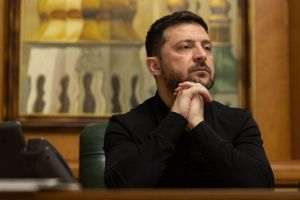Just three days before the UN conference, convened by France and Saudi Arabia, to discuss the relaunch of the Middle East peace process and the post-conflict reconstruction of Gaza, which will take place on July 28 and 29 in New York, French President Emmanuel Macron officially announced that his country will officially recognize the state of Palestine in September.
Emmanuel Macron said on Thursday evening that the recognition of Palestine would take place "on a schedule coordinated with European partners," but "without waiting for a global consensus, which is impossible to achieve at this time."
President Macron said: "France believes that the two-state solution is the only realistic and sustainable way to end the violence and offer the Palestinian people a dignified future and Israel legitimate security. We cannot perpetuate ambiguity while Gaza is in ruins and Jerusalem is engulfed in hatred.” He added that Paris would act "in coordination with European partners, but without being a prisoner of a global consensus that has meant inaction for 30 years.”
According to French diplomatic sources quoted by the daily Le Monde, a formal decision on France's unilateral recognition of Palestine could be announced in the coming weeks, depending on the results of the conference.
President Emmanuel Macron's statement on France's readiness to recognize the state of Palestine represents a clear departure from Paris's traditional neutrality in the Israeli-Palestinian conflict and a strategic repositioning at a time of acute crisis in the Middle East. Beyond the symbolic dimension, the gesture aims to reconfigure France's role as Europe's political and moral leader, in a context in which Brussels hesitates, Berlin refuses unilateral action, and Washington remains locked in electoral calculations. However, this courageous positioning involves major diplomatic risks: straining bilateral relations with Israel, the possible cooling of dialogue with the US, but also internal pressure from those who believe that recognition without direct negotiation fuels radicalism in the region.
• Israel reacts
And the Israeli authorities reacted immediately after the French president's statement. Prime Minister Benjamin Netanyahu declared that France "betrays its role as a balanced mediator" and that Emmanuel Macron's statement "encourages terrorism by unilaterally recognizing a Hamas-controlled regime."
"France rewards terrorism. Any state that unilaterally recognizes Palestine in this context is positioning itself against Israeli security," said Benjamin Netanyahu, according to a press release from the Israeli government.
Defense Minister Israel Katz denounced the move as "a disgrace” and "a capitulation to terrorism,” saying France was weakening Israel's position at a time of heightened tension, while Deputy Prime Minister and Justice Minister Yariv Levin added that the decision was a "black mark on French history” and a betrayal of Paris's supposed role as a neutral mediator, according to media reports in Tel Aviv and Jerusalem.
Israeli media outlets reported that France's move was being interpreted as a tough diplomatic signal that could lead to reduced intelligence cooperation or even the annexation of territories as a sign of political retaliation. In the eyes of many Israeli commentators, the premature recognition is dangerous and undermines the possibility of a negotiated solution between the parties. At the same time, Israeli authorities have expressed concern that the Paris move amounts to legitimizing the Hamas regime, which is considered a terrorist organization, which undermines any effort to build a stable peace.
Meanwhile, Macron's statement was enthusiastically received by the leaders of Jordan, Egypt and Qatar, who are participating in the UN conference starting today and have been supporting the recognition of Palestine in international forums for years. King Abdullah II of Jordan said that "France is showing courage and foresight”.
In the Arab world, reactions were enthusiastic. Al Jazeera headlined: "France breaks Western silence - Macron gives a signal of historic justice for Palestine”. An editorial in the Saudi daily "Asharq Al-Awsat” welcomed the gesture as "a necessary moral repositioning”, noting that "Arab leaders, who will be present in New York, will have in Macron a public ally, not just a discreet interlocutor”. In Egypt, the statement was welcomed, and analysts in the region speculate that it could encourage other European states, notably Spain and Ireland, to follow suit.
The Russian press interpreted France's gesture in a broader geopolitical context. "Rossiiskaia Gazeta” writes that "the West is beginning to recognize its failure in the Middle East, France wants to rebuild its prestige on the ruins of American policy in the region”. In an analysis published in "Sputnik Arabic”, it is noted that "Macron is taking advantage of the absence of global leadership and the increasingly visible isolation of Israel to re-enter the game as a major player in the Arab world”. The Kremlin did not issue an official statement, but Russian diplomats discreetly told the press that "France's gesture is logical and necessary” in the current climate.
• Conflicting positions within the EU
In contrast, reactions within the European Union were mixed. German Chancellor Friedrich Merz said that Germany "cannot support unilateral recognition at this time”, evoking the risk of "blocking direct dialogue between the parties”. In return, Spain, Ireland, Slovenia and Norway welcomed Macron's statement and called for a "coordinated European initiative”.
President Emmanuel Macron's statement also dominated the European press, which covered this unprecedented political move. Major British, French, German and pan-European publications have treated Macron's gesture not just as a symbolic act, but as a turning point in the European Union's approach to the Israeli-Palestinian conflict. In the United Kingdom, Macron's statement has reignited domestic political debate. The Times reported that the leader of the opposition Labour Party, Keir Starmer, is under increasing pressure from within his own party to follow France's example. The shadow foreign secretary, Shabana Mahmood, has publicly supported the recognition of Palestine, saying it would bring "clear benefits for regional security and for restoring confidence in the two-state solution.” British journalists see France's gesture as an invitation to London to abandon political ambiguity and become directly involved in recalibrating European policy towards the Middle East.
The British daily The Guardian wrote that France is "breaking the complicit silence of the West,” presenting Macron's statement as the first clear, articulate and firm action by a Western leader who no longer takes refuge in vague diplomatic formulas. The Financial Times assessed that the official recognition of Palestine, announced for September, will put pressure not only on Israel, but also on European countries that are hesitant to assume a coherent position.
In the same vein, the Belgian publication Le Soir emphasizes that France is resuming a role that it has lost in recent years - that of an independent geopolitical actor, capable of proposing its own vision of peace in the Middle East. Belgian political analysts note that the initiative of Paris could force other European states - especially Belgium, Spain, Ireland and Portugal - to emerge from passivity.
In Germany, however, the reactions are more reserved, faithfully reflected in the national press. Die Welt and Frankfurter Allgemeine Zeitung warn that a unilateral gesture, even if symbolic, risks worsening polarization and weakening Europe's already tense relations with Israel. Germany remains cautious, and German journalists note that Chancellor Friedrich Merz is wary of supporting the French initiative without security guarantees for the state of Israel.
• US urges caution
Politico Europe published an overview in which it considers that Macron has made a risky but necessary bet at a time when the EU seems paralyzed in the face of a devastating conflict. The article emphasizes that recognizing Palestine will not solve the conflict, but it can reset the discussion framework and stimulate a reactivation of diplomatic mechanisms that have been blocked for years. It is also noted that Washington's reaction has been rather restrained, which offers a rare room for maneuver for an autonomous European initiative in the region.
The Trump administration has sent a message of caution, through Secretary of State Marco Rubio, who said that "any unilateral move could harm the chances of resuming a real peace process.” However, Washington is participating in the UN Conference these days, where it will advocate for a plan for the economic reconstruction of the Gaza Strip and for the relaunch of a "diplomatic roadmap.”
The UN Conference on July 28-29 is seen as the most important diplomatic forum on Palestine in the last 20 years. Several European states, including Ireland, Norway, Slovenia and Portugal, are expected to support France's position. If Paris follows through on its decision announced by President Emmanuel Macron, pressure will increase on other Western and European capitals, including Romania, which will be forced to reconsider their position on recognizing the state of Palestine.

















































